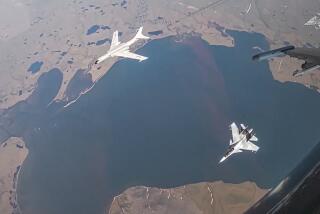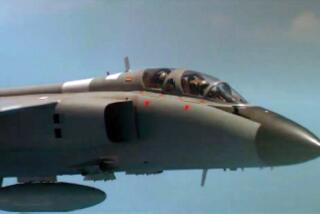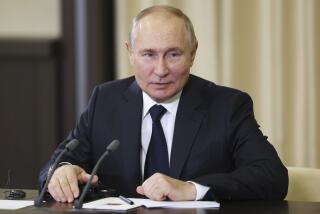Gates confident of China leader’s control over military
Reporting from Tokyo — China’s recent test flight of a stealth fighter illustrated a worrisome “disconnect” between its military and civilian leaders, Defense Secretary Robert M. Gates said Friday.
The test of the J-20 fighter occurred Tuesday, while Gates was in Beijing. When he inquired about it at a meeting, Chinese President Hu Jintao seemed unaware it had occurred, Pentagon officials said.
It was the latest in a series of incidents, including a 2007 anti-satellite missile test and a 2009 confrontation between Chinese vessels and a U.S. surveillance ship in the South China Sea, in which civilian leaders in Beijing appeared unaware or poorly informed about the activities of the armed forces, Gates said.
Gates was asked about the incident after a speech at Tokyo’s Keio University at the end of a weeklong trip to Asia. He called the lack of communication “a worry,” but he was careful to add that such episodes did not suggest China’s civilian leaders lack control over its military.
“In the larger sense of who controls the Chinese military and who has the ultimate authority, there is no doubt in my mind that it is President Hu Jintao and the civilian leadership of that government.”
Nor did Gates mention a larger worry — that command and control of China’s nuclear weapons was potentially uncertain.
He said concerns about China’s failure to share information was one reason he pressed its leaders to agree to an expanded security dialogue with the U.S. that would involve both the civilian and military establishment.
Gates also urged Japan to broaden its military role in East Asia to deal with emerging threats from North Korea and China and to recognize the importance of having U.S. forces on its territory.
He said North Korea’s pursuit of nuclear weapons and long-range ballistic missiles, along with Chinese military gains that include cyber and anti-satellite capabilities, underscored the need for preserving and broadening the 50-year-old U.S.-Japan military alliance.
“As our alliance grows and deepens further still, it will be important for Japan to take on an even greater regional and global leadership role that reflects its political, economic and military capacity,” Gates said a day after meetings with Japanese leaders.
He called for “modernizing our force posture and other defense arrangements” to deal with North Korea and China, though he did not believe the Chinese were an “inevitable strategic adversary” of the United States.
Gates acknowledged the political sensitivity of pressing for a greater military role by Japan, whose constitution limits its armed forces to a defensive posture. How to reconcile that with U.S. calls for Japan to play a greater military role has long been a divisive issue within Japan and in East Asia.
The Defense secretary also argued that having U.S. bases in Japan remained a critical element of U.S. strategy in the region. Critics have raised questions about the need for such a presence more than 60 years after World War II.
Without the U.S. bases, he said, North Korea would be even more belligerent, China might be more “assertive toward its neighbors,” and humanitarian relief operations would take longer and be costlier.
Citing Japan’s participation in humanitarian relief in Indonesia, its development with the U.S. of advanced ballistic missile defense and other military ventures, Gates said that taking part “in these activities thrusts Japan’s military into a relatively new, and at times sensitive, role as an exporter of security.”
He said President Obama has committed the U.S. to a strategy of engagement and cooperation with special emphasis on Asia, but that “to do this, we need a committed and capable security partner in Japan.”
In response to recent calls by North Korea for a resumption of diplomatic contacts after its shelling of a South Korean island, he said the U.S. wanted to see “concrete steps” by Pyongyang to show it is serious before a resumption of diplomatic contacts.
“When and if North Korea’s behavior gives us any reasons to believe that negotiations can be conducted productively and in good faith, we will work with Japan, South Korea, Russia and China to resume engagement dialogue with North Korea,” Gates said.
This week, Gates said the North could announce a freeze on missile or nuclear tests as an example that it is serious about lowering tensions on the Korean peninsula. He added that any resumption of diplomatic contacts should begin with talks between North Korea and South Korea.
Gates said the situation on the peninsula is especially volatile because the South may feel the need to respond to any new military moves by the North.
An international inquiry found that the North sank a South Korean patrol boat in March, killing 46. In November, the North barraged Yeonpyeong Island with artillery, killing four people.
More to Read
Sign up for Essential California
The most important California stories and recommendations in your inbox every morning.
You may occasionally receive promotional content from the Los Angeles Times.











